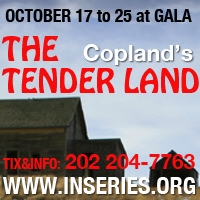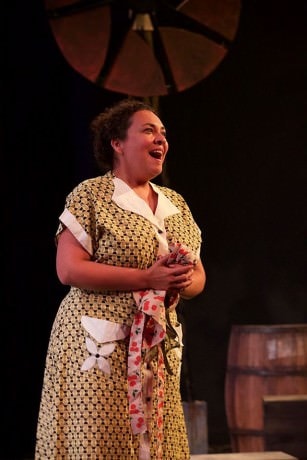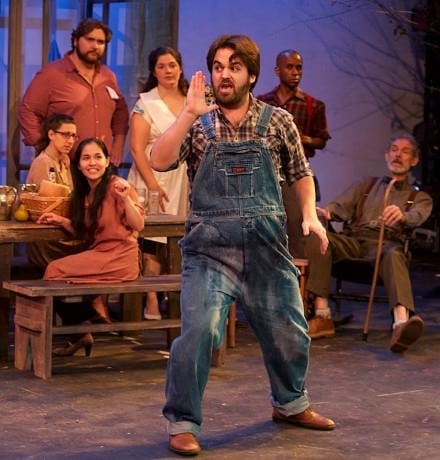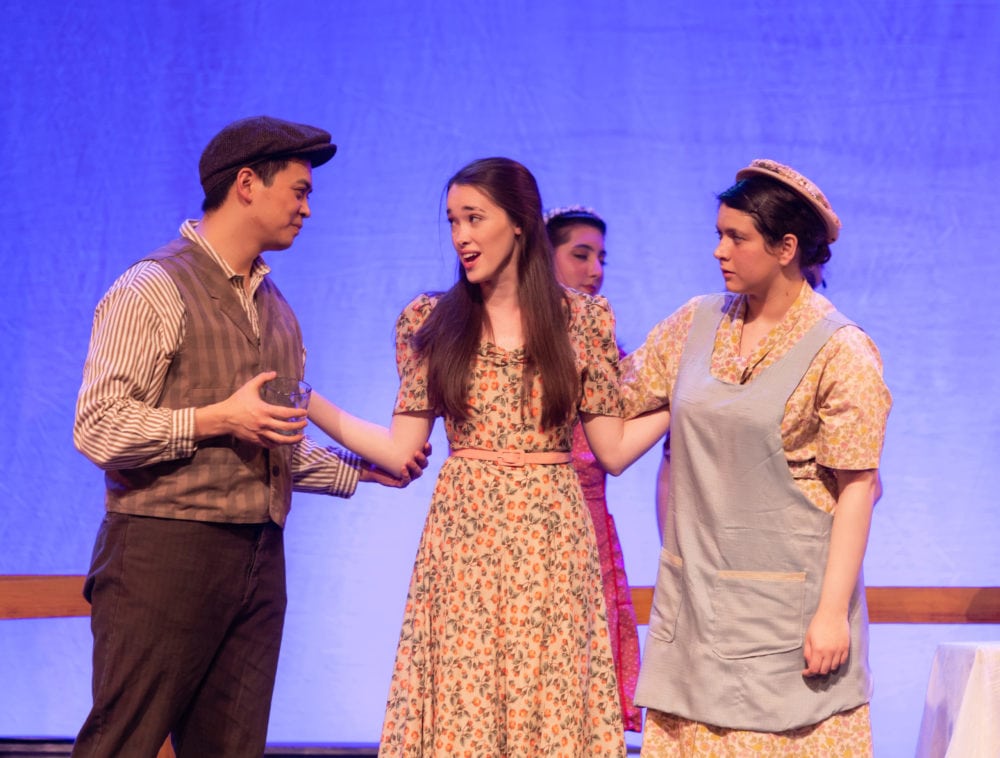
I have to admit that I didn’t know much about Aaron Copland going into Catholic University’s production of The Tender Land. This opera, penned in the ’50s and set in the Depression era, boasts music by Copland and a book by Erik Johns (writing under the pseudonym Horace Everett). Directed by James Hampton, Catholic University’s production has the good fortune of featuring Murry Sidlin’s arrangement for chamber orchestra. Sidlin also conducts. Ward Recital Hall, with its exposed brick walls, slightly industrial feel, and smaller stage, provides the perfect acoustics for this tale, which provides only a tiny glimpse of the characters’ lives.
As a mid-century opera, The Tender Land certainly typifies the musical style of that era. Copland’s music swells and retracts as the sun rises and sets on the tight-knit rural community where soon-to-be high-school graduate Laurie (Isabel O’Hagan), her mother (Emberlein Disalvo, as “Ma Moss”), and her grandfather (Joey Chee, as “Grandpa Moss”) live. Drifters Martin (Tae Cha) and Top (Eric Gramatges) have rolled into town looking for work and food. A series of assaults on local young women has awakened the community’s suspicions toward strange men, so it spells trouble when the roving Martin falls for Laurie. Much of the drama revolves around Ma Moss’s distrust of the men, Grandpa Moss’s ornery behavior and overprotectiveness of Laurie and her mother, and Laurie and Martin’s burgeoning relationship.
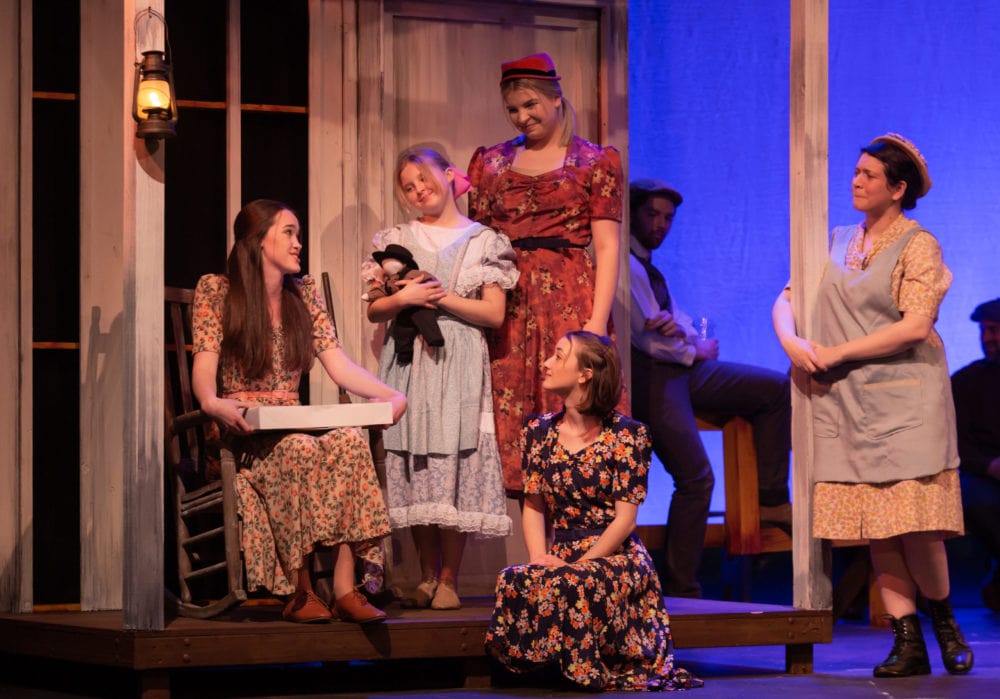
University productions of operas can be very hit-or-miss, often due to a mismatch in the expectations of the department with the natural talents of their current cohort of students. This is not the case with The Tender Land. Its stellar performances, along with appropriate lighting and scenic design, elevate this opera above your typical college-level fare. Believe me when I tell you that these singers are going somewhere. O’Hagan has a clarity and sharpness to her soprano that mingles well with Cha’s warm tenor during Laurie and Martin’s romantic moments. O’Hagan and Cha wouldn’t have been out of place in any professional production. Joey Chee’s booming bass lends an imposing quality to Grandpa Moss, whose presence was genuinely unnerving at times. It’s clear that Chee’s passion comes from deep within; the singer’s whole being is visibly engaged with the craft as he stomps around the stage with his ever-watchful eye. Similar to Chee in wholehearted delivery is Disalvo, whose work as Ma Moss lends a believability and sorrow to the depth of the character’s shattered expectations of her own life. Also notable is Anastasia Fitenko as Beth, Laurie’s younger sister, whose youthful buoyancy adds a lightness to this sometimes bleak opera.
The richness of the combined singers’ vocals made for a particularly touching rendition of “The promise of living.” While the pieces that drew the ensemble intended to be the most powerful, O’Hagan’s delivery of the aria “Once I thought I’d never grow” and Cha’s “Daylight will come in such a short time” were also highlights.
The neutral tones of Scenic Designers Mark and Katherine Wujcik’s set were backlit by Lighting Designer Katie McCreary. The simple, white cyclorama was extremely effective at showing time of day, as McCreary shifts the overall color tone to match the setting. While scenic design evokes the vast, brown fields of painter Andrew Wyeth, it maintains the intimacy and detail of, say, Grant Wood’s “American Gothic.” Media set in the Dust Bowl era always has the potential to look washed out and dull, but here it is given an appropriate amount of pastoral grit and character.
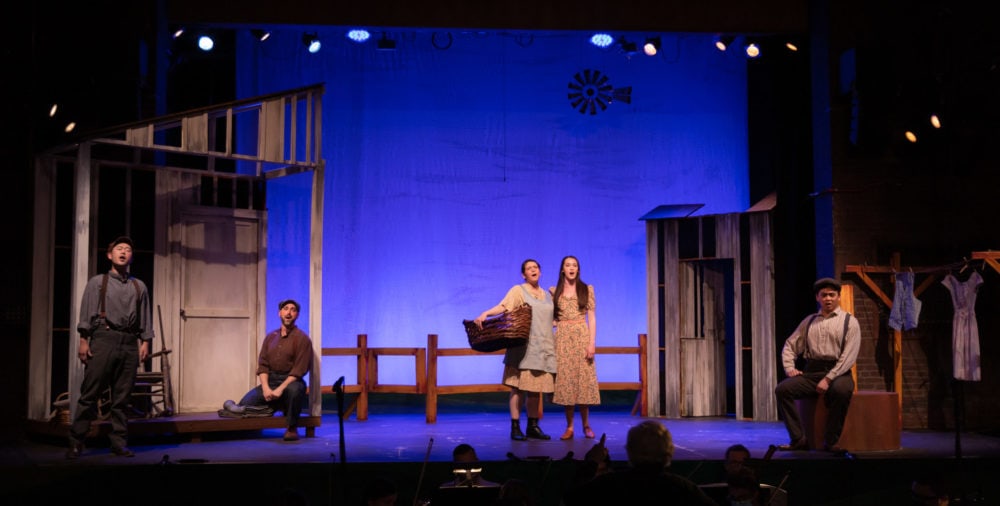
Speaking of Andrew Wyeth, watching this opera was—thematically—a bit like looking at “Christina’s World.” It seems a simple concept on the surface, but, as with the Wyeth painting, its somewhat austere and grim subject matter represents more of a triumph over our physical realities and seeming limitations than anything else. The Tender Land has layers upon layers; there’s much here to enjoy regardless of what your background or life experience is. This fan of big, Baroque operas walked away from this production very intrigued by the quietness and depth of Copland’s work—and interested in seeing more of it.
The Tender Land comes across as a professional production because the students involved are professionals. The talent of the singers and the cohesion of the design make this a very auspicious production to be involved in—and one that I highly recommend people attend.
Running Time: Two hours, including one 15-minute intermission.
The Tender Land plays through March 27, 2022, at Ward Recital Hall at The Catholic University of America—348 University Drive NE in Washington D.C. Tickets can be purchased online.
